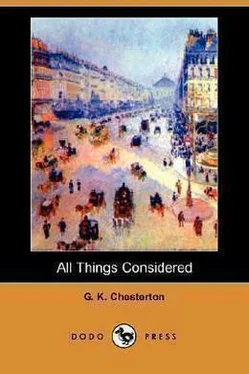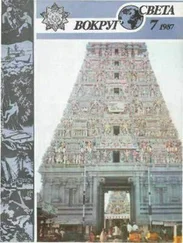As to the affair of the English monument to Shakspere, every people has its own mode of commemoration, and I think there is a great deal to be said for ours. There is the French monumental style, which consists in erecting very pompous statues, very well done. There is the German monumental style, which consists in erecting very pompous statues, badly done. And there is the English monumental method, the great English way with statues, which consists in not erecting them at all. A statue may be dignified; but the absence of a statue is always dignified. For my part, I feel there is something national, something wholesomely symbolic, in the fact that there is no statue of Shakspere. There is, of course, one in Leicester Square; but the very place where it stands shows that it was put up by a foreigner for foreigners. There is surely something modest and manly about not attempting to express our greatest poet in the plastic arts in which we do not excel. We honour Shakspere as the Jews honour God—by not daring to make of him a graven image. Our sculpture, our statues, are good enough for bankers and philanthropists, who are our curse: not good enough for him, who is our benediction. Why should we celebrate the very art in which we triumph by the very art in which we fail?
England is most easily understood as the country of amateurs. It is especially the country of amateur soldiers (that is, of Volunteers), of amateur statesmen (that is, of aristocrats), and it is not unreasonable or out of keeping that it should be rather specially the country of a careless and lounging view of literature. Shakspere has no academic monument for the same reason that he had no academic education. He had small Latin and less Greek, and (in the same spirit) he has never been commemorated in Latin epitaphs or Greek marble. If there is nothing clear and fixed about the emblems of his fame, it is because there was nothing clear and fixed about the origins of it. Those great schools and Universities which watch a man in his youth may record him in his death; but Shakspere had no such unifying traditions. We can only say of him what we can say of Dickens. We can only say that he came from nowhere and that he went everywhere. For him a monument in any place is out of place. A cold statue in a certain square is unsuitable to him as it would be unsuitable to Dickens. If we put up a statue of Dickens in Portland Place to–morrow we should feel the stiffness as unnatural. We should fear that the statue might stroll about the street at night.
But in France the question of whether Zola shall go to the Panthéon when he is dead is quite as practicable as the question whether he should go to prison when he was alive. It is the problem of whether the nation shall take one turn of thought or another. In raising a monument to Zola they do not raise merely a trophy, but a finger–post. The question is one which will have to be settled in most European countries; but like all such questions, it has come first to a head in France; because France is the battlefield of Christendom. That question is, of course, roughly this: whether in that ill–defined area of verbal licence on certain dangerous topics it is an extenuation of indelicacy or an aggravation of it that the indelicacy was deliberate and solemn. Is indecency more indecent if it is grave, or more indecent if it is gay? For my part, I belong to an old school in this matter. When a book or a play strikes me as a crime, I am not disarmed by being told that it is a serious crime. If a man has written something vile, I am not comforted by the explanation that he quite meant to do it. I know all the evils of flippancy; I do not like the man who laughs at the sight of virtue. But I prefer him to the man who weeps at the sight of virtue and complains bitterly of there being any such thing. I am not reassured, when ethics are as wild as cannibalism, by the fact that they are also as grave and sincere as suicide. And I think there is an obvious fallacy in the bitter contrasts drawn by some moderns between the aversion to Ibsen's "Ghosts" and the popularity of some such joke as "Dear Old Charlie." Surely there is nothing mysterious or unphilosophic in the popular preference. The joke of "Dear Old Charlie" is passed—because it is a joke. "Ghosts" are exorcised—because they are ghosts.
This is, of course, the whole question of Zola. I am grown up, and I do not worry myself much about Zola's immorality. The thing I cannot stand is his morality. If ever a man on this earth lived to embody the tremendous text, "But if the light in your body be darkness, how great is the darkness," it was certainly he. Great men like Ariosto, Rabelais, and Shakspere fall in foul places, flounder in violent but venial sin, sprawl for pages, exposing their gigantic weakness, are dirty, are indefensible; and then they struggle up again and can still speak with a convincing kindness and an unbroken honour of the best things in the world: Rabelais, of the instruction of ardent and austere youth; Ariosto, of holy chivalry; Shakspere, of the splendid stillness of mercy. But in Zola even the ideals are undesirable; Zola's mercy is colder than justice—nay, Zola's mercy is more bitter in the mouth than injustice. When Zola shows us an ideal training he does not take us, like Rabelais, into the happy fields of humanist learning. He takes us into the schools of inhumanist learning, where there are neither books nor flowers, nor wine nor wisdom, but only deformities in glass bottles, and where the rule is taught from the exceptions. Zola's truth answers the exact description of the skeleton in the cupboard; that is, it is something of which a domestic custom forbids the discovery, but which is quite dead, even when it is discovered. Macaulay said that the Puritans hated bear–baiting, not because it gave pain to the bear, but because it gave pleasure to the spectators. Of such substance also was this Puritan who had lost his God. A Puritan of this type is worse than the Puritan who hates pleasure because there is evil in it. This man actually hates evil because there is pleasure in it. Zola was worse than a pornographer, he was a pessimist. He did worse than encourage sin: he encouraged discouragement. He made lust loathsome because to him lust meant life.
Some time ago I ventured to defend that race of hunted and persecuted outlaws, the Bishops; but until this week I had no idea of how much persecuted they were. For instance, the Bishop of Birmingham made some extremely sensible remarks in the House of Lords, to the effect that Oxford and Cambridge were (as everybody knows they are) far too much merely plutocratic playgrounds. One would have thought that an Anglican Bishop might be allowed to know something about the English University system, and even to have, if anything, some bias in its favour. But (as I pointed out) the rollicking Radicalism of Bishops has to be restrained. The man who writes the notes in the weekly paper called the Outlook feels that it is his business to restrain it. The passage has such simple sublimity that I must quote it—
"Dr. Gore talked unworthily of his reputation when he spoke of the older Universities as playgrounds for the rich and idle. In the first place, the rich men there are not idle. Some of the rich men are, and so are some of the poor men. On the whole, the sons of noble and wealthy families keep up the best traditions of academic life."
So far this seems all very nice. It is a part of the universal principle on which Englishmen have acted in recent years. As you will not try to make the best people the most powerful people, persuade yourselves that the most powerful people are the best people. Mad Frenchmen and Irishmen try to realise the ideal. To you belongs the nobler (and much easier) task of idealising the real. First give your Universities entirely into the power of the rich; then let the rich start traditions; and then congratulate yourselves on the fact that the sons of the rich keep up these traditions. All that is quite simple and jolly. But then this critic, who crushes Dr. Gore from the high throne of the Outlook , goes on in a way that is really perplexing. "It is distinctly advantageous," he says, "that rich and poor— i. e. , young men with a smooth path in life before them, and those who have to hew out a road for themselves—should be brought into association. Each class learns a great deal from the other. On the one side, social conceit and exclusiveness give way to the free spirit of competition amongst all classes; on the other side, angularities and prejudices are rubbed away." Even this I might have swallowed. But the paragraph concludes with this extraordinary sentence: "We get the net result in such careers as those of Lord Milner, Lord Curzon, and Mr. Asquith."
Читать дальше








